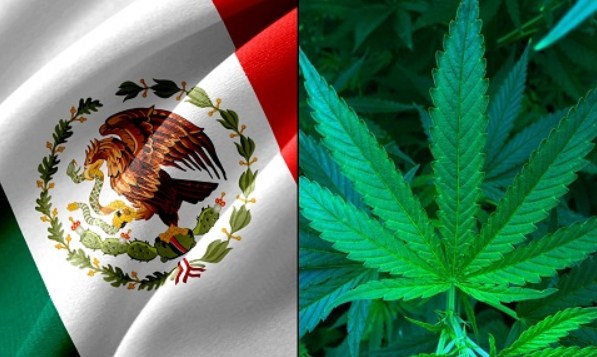Mexican Drug Cartels Prepare for Marijuana Legalization, Plan to Enter New Industry
According to recent reports, Mexican drug cartels—which were previously thought to fear the prospect of full legalization due to the potential loss of a major revenue stream—are actually welcoming the upcoming reforms and are making plans to infiltrate the regulated marijuana market.
Currently, Mexico’s legislative assembly is working rapidly to finalize a bill for full recreational legalization, aiming to present the finished project to the public and government by the end of April this year. A few weeks ago, authorities already unveiled a plan to legalize and regulate the therapeutic marijuana market, which is expected to launch by late winter or early spring. Although the project was originally supposed to be completed by the end of 2020, new technical delays led the country’s Supreme Court to extend the deadline to the end of April 2021, allowing officials to address all details and aspects of the legislation.
Despite some skepticism from President Obrador’s administration (the president himself initially opposed any form of cannabis reform), the government ultimately concluded that regulating the recreational and therapeutic marijuana markets under Mexican law would remove the industry from cartel control, depriving criminal groups of a major source of income. This, in turn, would significantly weaken their influence and help authorities combat both organized crime and corruption. Obrador’s administration has repeatedly stated in public that the main goal of legalization is to financially undermine criminal organizations that effectively control certain regions of the country. So far, this position has been supported by facts, such as a significant drop in black-market marijuana production in Mexico, directly linked to the expansion of recreational and therapeutic cannabis reform in the United States over the past decade—the main market for Mexican-grown marijuana.
However, information provided by journalists and political analysts since the beginning of the year suggests that cartel leaders are not only well aware of the threat posed by reform, but are actively preparing for it. They already have action plans in place to “infiltrate” the legal market and potentially take it over.
According to sources cited by The Daily Beast, the Sinaloa cartel—one of the country’s largest drug cartels and the main marijuana producer in Mexico—has been working with lawyers for several months, exploring various legal avenues to enter the legitimate cannabis market.
“The cartel bosses have long been consulting with the country’s top lawyers about how to ‘legitimize’ their cannabis business,” an anonymous source, reportedly an employee of a major underground cartel grow operation, told the publication. “I can say for sure that the leadership is not afraid of full legalization—they welcome it. It seems the bosses want to launch several independent companies managed by ‘clean’ outside managers and fully transition from semi-wild marijuana to legal, high-quality strains that can be sold at much higher prices—and completely legally.”
This approach makes sense. Until now, criminal organizations have grown marijuana on secret, open-air plantations in rural areas, producing only local, semi-wild marijuana with relatively low THC content. While this product was of lower quality compared to American marijuana, cartels profited from its sheer volume, smuggling it by the ton into all regions of the U.S. and selling it at highly inflated prices. However, with the rise of legal competition in the U.S.—which began producing higher-quality, cheaper, and, most importantly, legal marijuana—this business model started to fail. After studying their new competitors, cartel leaders seem to have reached an obvious conclusion: instead of fighting the new industry, they could simply take it over. Cartels already have the resources and expertise to enter the legal market, and legal barriers designed to keep criminals out can be easily bypassed using front companies and unofficial associates. In effect, these organizations can unofficially legalize their business under the guise of legitimate, cartel-unaffiliated companies, collecting profits from the now legally exported high-quality marijuana. Ultimately, this new business model could be even more profitable for the cartels, allowing them to earn larger, nearly legal incomes while avoiding law enforcement attention and the costs previously spent on protecting illegal plantations.
“Our breeders have been studying and crossbreeding high-quality strains for almost six months now, apparently aiming to develop their own high-yield, high-THC hybrids for the legal market,” the Daily Beast source said. “As far as I know, these experiments use seeds from all over the world, including American seed banks and stores based in various European countries. I’ve heard they managed to create a particularly potent hybrid based on California Dream and some German strains, supposedly containing about 50-60% THC, compared to the standard 5-8% found in local landraces.”
The anonymous source also confirmed that the Sinaloa cartel has already set up an indoor plantation modeled after a high-quality American commercial marijuana production center. This facility, covering 50 acres, is equipped with an automated irrigation and fertilizer distribution system, as well as climate control to maintain optimal conditions for hundreds, if not thousands, of marijuana plants.
“As we suspected, the bill proposed by the authorities really doesn’t contain serious restrictions that would keep cartel associates out of the market, which will definitely allow criminals to quickly take over what is supposed to be a ‘free’ market,” said Zara Snapp, head of the activist organization RIA Institute, which has previously expressed concerns about cartel infiltration of the new marijuana market. “We can only hope that as these organizations infiltrate the market, they will gradually transition to fully legal operations, abandoning their current business practices that involve violence against competitors and corrupting officials. In the worst-case scenario, it’s possible these groups could completely monopolize the national marijuana market, pushing out even foreign companies with their resources and official government support.”
Our other channels
Our friends and partners



